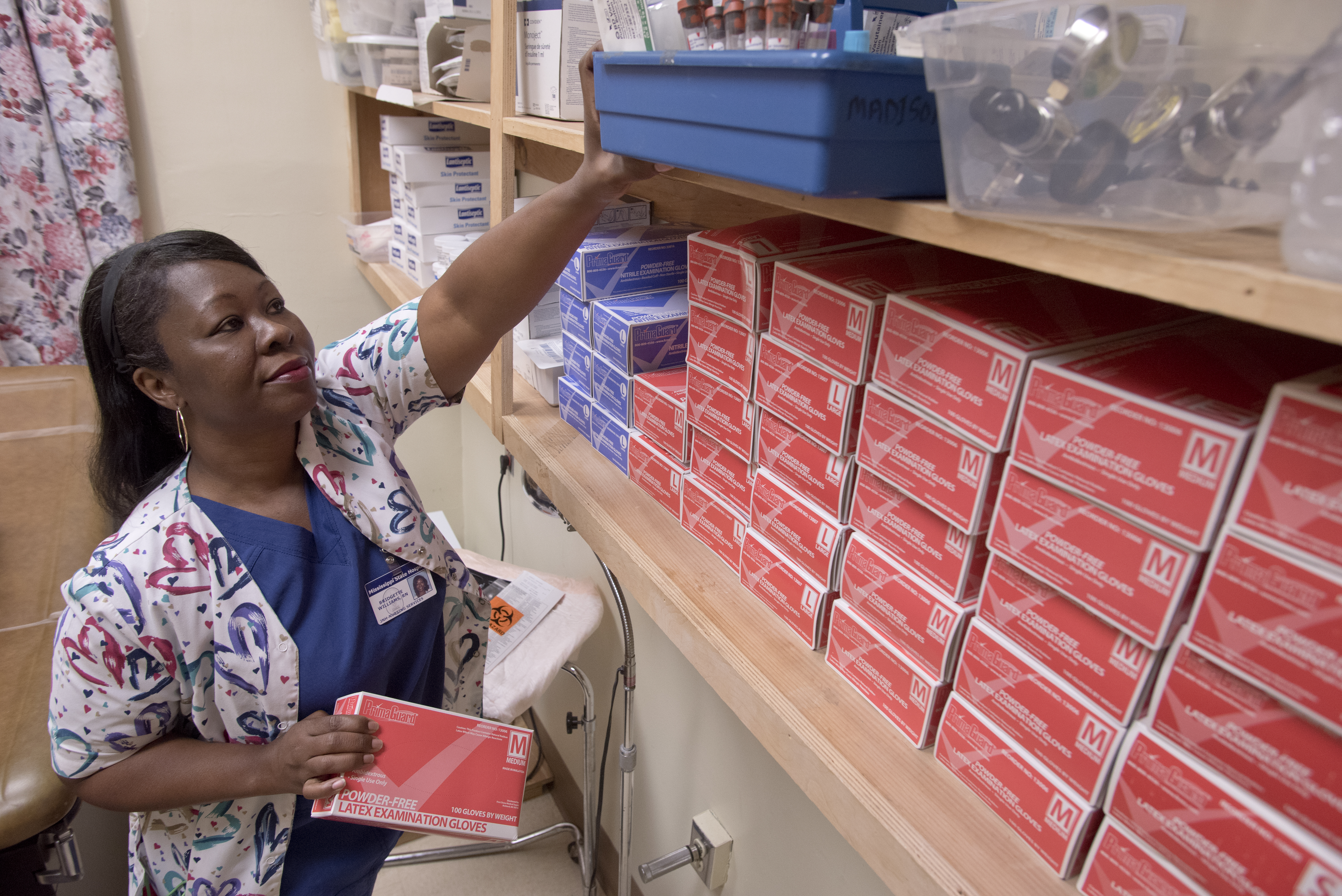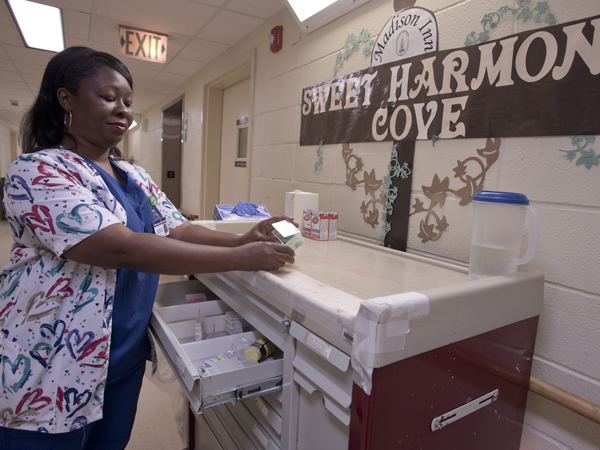Fellowship's focus: long-term health-care quality

Published in News Stories on September 26, 2016
A collaboration between the University of Mississippi School of Nursing and Information & Quality Healthcare, a member of the atom Alliance, a five-state Quality Improvement Network-Quality Improvement Organization providing services in Alabama, Tennessee, Kentucky, Indiana and Mississippi, is aiding implementation of key health-care related legislation.
The collaboration is the brainchild of Dr. Robin Christian, associate professor of nursing.
“Really, the kick-off was the Affordable Care Act of 2010,” Christian said.

Christian
She said one of the aims of the ACA is to shift the focus to quality when it comes to payment for health-care services. Providers are now reimbursed by Centers for Medicare and Medicaid Services (CMS) on the basis of the quality of the health care patients receive rather than the traditional fee-for-service model.
Just how does one link quality to payment?
During the last six years, CMS has developed an alphabet soup of tools used to track health-care quality for hospitals: HRRP, HVBP, HACRP and more. With the addition of the IMPACT Act of 2014, measures have been introduced to improve the quality of long-term health care provided by facilities such as skilled nursing facilities, nursing homes, home health agencies and inpatient rehabilitation facilities.
“What started in the hospitals is now coming to the nursing homes,” Christian said.
IQH has helped Mississippi's health-care providers improve quality for 40 years. The organization acts as an education liaison between CMS and health-care providers in Mississippi. It allows providers to focus on continuing to provide quality care to patients without getting bogged down in new guidelines.

McDaniel
“When CMS puts out an initiative, we get the training and information and take it to the provider,” said Mae McDaniel, IQH quality improvement advisor. “No regulation. We are strictly education.”
“We are working with Mae and IQH in our Doctor of Nursing Practice quality improvement course,” Christian said. “When I met her, I thought this fellowship would be a perfect fit.”
The fellowship brings together instructors from the SON with advanced nursing degrees as mentors and front-line nursing staff from long-term care facilities throughout the state as fellows. The School of Nursing faculty serving as mentors are Christian; Dr. Kim Hoover, dean; Dr. Janet Harris, professor; Dr. Sheila Keller, associate professor; and Jennifer Hargett and Kimberly Douglas, instructors.
“The staff at UMMC are doctoral- and master's degree-prepared nurses working with our nursing homes. So it's academics and the workforce coming together,” McDaniel said. “I call it an excellent on-the-job training opportunity for our frontline nurses.”
The latest quality initiative from CMS that must be implemented for long-term care facilities is Quality Assurance Performance Improvement, or QAPI.

Dr. Kim Hoover, dean of the School of Nursing, addresses the first meeting of fellows and mentors of the SON/IQH Fellowship.
“Out of the ACA came the requirement for every nursing home nationwide to have a QAPI-written plan in place,” McDaniel said. “A part of that rule is developing a mission statement, writing out how they will carry out their day-to-day work. It's kind of like a business plan built on evidence-based practice.”
McDaniel said that CMS looks at 13 long-stay quality measures to track data from facilities to determine the quality of care being received by residents. Some are existing quality measures that have been tracked for some time, such as pressure ulcers and falls with major injury acquired in the facility.
“The data is the only thing that CMS has to determine what kind of care is being provided, to indicate whether that facility is doing well and preventing decline in their residents,” she said.
Other long-stay quality measures address issues such as self-reported moderate-to-severe pain, influenza and pneumococcal vaccination rates, occurrence of urinary tract infection, bladder and bowel control, catheterization, physical restraints, need for assistance with daily activities, weight loss, depressive symptoms and percentage of residents receiving antipsychotic medication.

During the initial meeting of the SON/IQH Fellowship in April, Williams discussed how she became a long-term care nurse.
Bridgette Williams, a nurse at Jaquith Nursing Home on the campus of the Mississippi State Hospital in Whitfield, is one of five long-term care nurses taking part in the fellowship. Dr. Sheila Keller, associate professor of nursing, serves as her mentor. Keller said her philosophy is to meet the nurse where she is in the quality improvement process.
“With the fellowship, we made the effort in the beginning. We had several days where we brought all the fellows in and gave them a good solid background on quality improvement and the tools that are available to them,” Keller said. The fellowship first met in April with a two-day workshop to introduce the program.
“Long-term care nurses are good with quality assessment and keeping up with the standards required by CMS,” Keller said. “They've done that forever, but the idea of developing a quality improvement plan has been foreign to them. Depending on what type of program a nurse graduated from, they are exposed to varying degrees of quality improvement tools.

Keller
“We tried to get them all on the same page, so to speak. So when they go back to their facilities, they can begin to think about that and use those tools.”
After the introductory meeting, the fellows were tasked with coming up with a quality improvement project for their own facility.
“My project is to reduce antipsychotic use by 12 to 15 percent,” Williams said. “I noticed that was driving up our composite score.”
“Bridgette has determined what the best practices are for reducing antipsychotic use,” Keller said. “She has met with her administrators, director of nursing and physicians for her two facilities. They are all on board.”
“When I told the director of Jaquith, Bill Bullock, about our project, immediately he was on board,” Williams said. “He thought it was a great idea, and he was willing to work with me.”
Keller said that it is important to get the buy-in from top facility administration. “They were very supportive of her and supportive of this project because they are all interested in improving the quality for the patients,” she said.
Williams said that one benefit of the project so far has been how it has opened up dialogue with other providers within the facility.

Williams has chosen to track the use of antipsychotic medications and take steps to reduce the number and amount of antipsychotics prescribed to patients.
“When you start something new, you have to meet a lot and you have to swap ideas,” Williams said. “That has helped us come together with this common goal. It also lets me see what other departments do. I can see how important everyone's job is.
“I've collaborated with pharmacy to provide prescription reports of the residents who are on antipsychotics so that I can compare the usage to see if the plan is working,” she said.
Part of her plan is to find alternatives to medication when dealing with a patient who is acting out or is exhibiting a new behavior, interventions such as redirecting or bringing in a social worker or family member. She said that the biggest challenge is breaking out of the norm and finding innovative alternatives to antipsychotics for behavior issues.
Within the next year, the quality measures will become final rules and long-term care facilities will be held accountable - financially - for the laws designed to revamp health care in the U.S. For now, it's up to the nurses in the field to create the incremental changes that will ensure facilities are obeying the law. It's a daunting task.
“I was overwhelmed at first, but I felt a lot better once Dr. Keller and Dr. Christian came out and talked to me,” Williams said. “Now I feel really good about it and I think it will be really good.”
“I think having the nurses as the 'boots on the ground' to implement these changes will make it happen,” Keller said.


